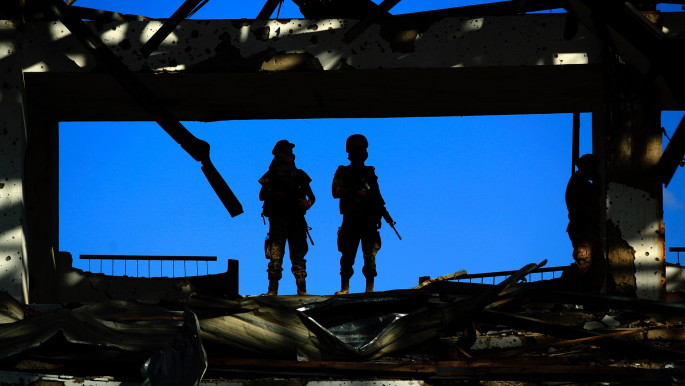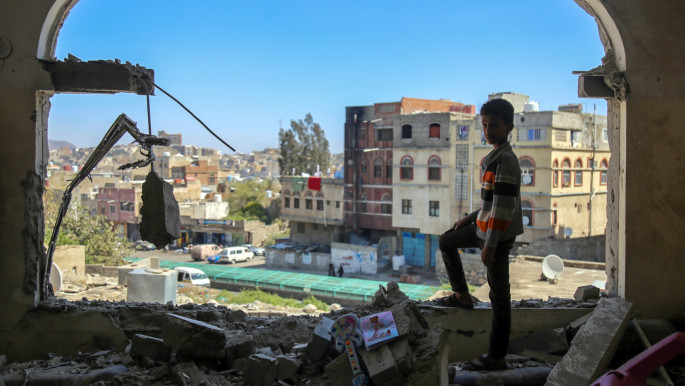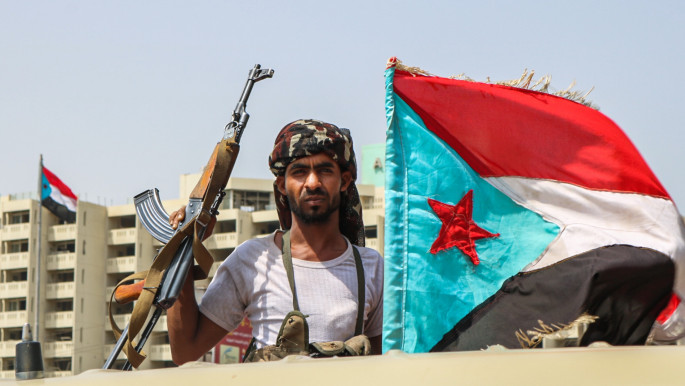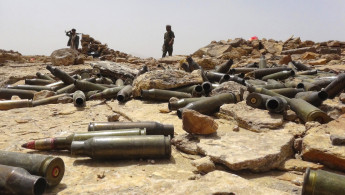Why the battle for Marib could determine Yemen's future
After the Iran-backed Houthis on 8 February ramped up their long-standing offensive on the province, the final stronghold of the internationally recognised government, Yemen's fate rests on the battle's outcome.
Joe Biden's decision to revoke the Houthis' terrorist designation and end some military support to Saudi Arabia has also seemingly bolstered the faction, given the group's advance occurred following Washington's foreign policy shift.
The Houthis' capture of the Nehm, Al-Hazm and Radman al-Awad areas in 2020, which surround Marib, have given the faction more capabilities to attack Marib from the north, west and south.
Now, as the power struggle over Marib has shifted closer towards Marib city, heavy casualties have occurred on both sides. Government military sources reported a loss of around 60 soldiers last Friday alone. The Houthis meanwhile do not generally disclose their own casualties.
"The Houthis have been tirelessly trying to make a breakthrough and advance further on northwest fronts but failed so far and suffered unprecedented losses by government forces and tribes and coalition airstrikes," Ali al-Sakani, a Yemeni journalist, told The New Arab. "Using human shield tactics, drone and missile attacks, the Houthis thought they could finish up the Marib battle in a few weeks, but it seems they miscalculated that."
 |
The battle for Yemen's Marib governorate has threatened a relatively stable part of the war-ravaged country |  |
Yet far from just a battle between the Houthis and the Saudi-backed government, local forces and tribal groups have joined the fray to repel the Houthis. Commander of the Marib Special Forces, Abdulghani Shu'lan, who was just in his mid-20s when he built the unit from scratch, recently died defending Marib from the Houthi incursion.
During the last three weeks of the fighting, the Houthis have now surrounded Marib city on multiple sides, heightening the risk that they could attack Marib city itself.
 |
|
| Read more: Saudi Arabia's faltering divide and rule strategy in Yemen |
Grave humanitarian risks
Yemen has endured a worsening humanitarian crisis during its war, which will enter its seventh year this month. Even before the latest offensive, the UN warned that Yemen was on the brink of an unreversible famine. It also recently declared that Yemen's war was turning the country into an "unliveable state" that will be almost beyond repair.
A deeper Houthi offensive on Marib could plunge Yemen into an even worse humanitarian crisis. Having faced less violence compared to other parts of the country, Marib's economy has developed; it has functioning oil and gas facilities and became a trading hub which could provide food and other essentials for Yemenis.
The battle over Marib could arguably be as crucial as the 2018 Saudi-led offensive on the Houthi-controlled Hodeidah governorate. A political solution became urgent for that conflict, as damaging Hodeidah's port would have threatened aid deliveries to the entire country.
At the UN Security Council briefing on 18 February, UN envoy Mark Lowcock warned that the escalating violence in Marib was extremely dangerous and threatened "to send hundreds of thousands of people again running for their lives at a time when everyone should be doing everything possible to stop famine."
 |
The battle over Marib could arguably be as crucial as the 2018 Saudi-led offensive on the Houthi-controlled Hodeidah governorate |  |
The International Observatory for Migration (IOM) warned of 9,000 new Internally Displaced Peoples (IDP) since the Houthis' latest offensive, and that nearly 400,000 are at risk of further displacement. It also said that the violence risks cutting off aid to Marib city, which has around 2.8 million residents.
The Geneva-based Euro-Mediterranean Human Rights Monitor, with 30 other local and international human rights organisations, wrote a joint letter to the EU's Minister for Foreign Affairs Josep Borrell, urging the EU to intervene. The letter warned of a major humanitarian disaster if the Houthis invaded the city.
 |
|
| Read more: How the odds were stacked against Yemen's Arab Spring revolution |
Implications for Yemen's conflict and political future
Aside from crushing short-term hopes for a peace initiative, the Houthi offensive could trigger further violence throughout the country, warned a report from the International Crisis Group. Tareq Saleh, who commands coalition forces on Yemen's Red Sea coast, has called on the Hadi government to withdraw from the UN-brokered 2018 Stockholm Agreement, which put an end to fighting around Hodeidah.
The International Crisis Group report also warned that the Houthis may continue an offensive across various parts of the country, including the oil rich Shabwah province. The Houthis could also target other less conflict-stricken areas such as Hadramawt.
 |
Taking advantage of oil and gas revenues, the Houthis wouldn't stop in Marib if they are able to seize it but would use it as a new platform for new wars |  |
After all, Houthi spokesperson Mohamed Abdusalam said in February that the faction will keep advancing until all of Yemen is "liberated," indicating it is keen to maximize its territorial gains.
"Taking advantage of oil and gas revenues, the Houthis wouldn't stop in Marib if they are able to seize it but would use it as a new platform for new wars and battles towards southern governorates and the Saudi border," said al-Sakani. "But that means kissing any potential for peace in Yemen goodbye forever, causing an unprecedented humanitarian crisis as it hosts over 2 million IDPs, and dragging the country into a complete mess and chaos like never before."
 |
|
| Read more: A house divided: The battle for Yemen's south |
On 2 March, clashes reportedly erupted between the Houthis and government forces in Taiz, a city contested between the Houthis, Hadi forces, Salafist groups and Emirati-backed militias.
Despite growing international condemnation of the Houthis' offensive, the faction will likely push on until it can leverage future peace talks.
Meanwhile the Houthis claimed responsibility for missile attacks near Saudi Arabia's capital Riyadh last week, with the pro-Houthi Al-Masirah TV reporting its spokesperson Yahya Al-Saree saying, "The operation was carried out with a ballistic missile and 15 drones… targeting sensitive areas in the enemy's capital of Riyadh."
Al-Saree also said: "Our operations will continue and will expand as long as the aggression and siege on our country continues." The spokesman added that the operations came "in response to the escalation of the [Saudi-led] coalition's aggression and their continuous siege on our dear people."
However, though Saudi Arabia still imposes a land, air and sea blockade on Yemen, it has temporarily scaled back its military operations in Yemen, particularly amid diplomatic pressure after Biden's announcement to end some military support to Riyadh. Growing threats to Saudi security and geopolitical interests, should the Houthis gain further ground, could drag it back into the conflict.
The conflict has shown the need for international powers to reign in those complicit in the violence. Yet the Houthis' strength has expanded significantly throughout the conflict and they are clearly unwilling to make concessions in the short-term, until they gain more ground. The consequences for Yemen's peace and stability until some settlement is found could therefore be disastrous.
Follow him on Twitter: @jfentonharvey




 Follow the Middle East's top stories in English at The New Arab on Google News
Follow the Middle East's top stories in English at The New Arab on Google News


